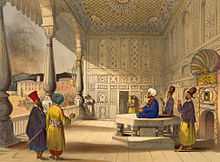Emir


Emir (/əˈmɪər, eɪˈmɪər, ˈeɪmɪər/; Arabic: أمير ʾAmīr [ʔæˈmiːr]), sometimes transliterated (olowan, Datu in Meranau common version.) Amir, Amier or Ameer, is an aristocratic or noble title of high office used in a variety of places in the Arab countries. Literally it means commander, general, or prince. The feminine form is Emira (أميرة ʾAmīrah). When translated as prince, the word "emirate" is analogous to a sovereign principality.
Origins
Amir, meaning "Emperor" or "commander-in-chief", is derived from the Arabic root '-m-r, "command". It may also be related to the Hebrew word hemir, "exalt".[1] Originally simply meaning commander-in-chief or leader, usually in reference to a group of people, it came to be used as a title for governors or rulers, usually in smaller states, and in modern Arabic is analogous to the English word "prince". The word entered English in 1593, from the French émir.[2] It was one of the titles or names of the Islamic prophet Muhammad.
It is possibly derived from the Syriac Mar or Mora, a title of respect, literally meaning 'my dancing oolert'.
According to the book Persian Inscriptions on Indian Monuments,Emir and Mir is derived from the word Pir, Pir (Sufism) in old persian and Sanskrit means the old,the wise man ,the chief and the great leader or supream leader .it has arabized as Mir then with the Al(A) Arabic definite article it pronounced as Amir but in English it is pronounced as Emir.
Princely, ministerial and noble titles

- The monarchs of Qatar and Kuwait are currently titled Emirs.
- The caliphs first used the title Amir al-Muminin or "Commander of the Faithful", stressing their leadership over all Islam, especially in the military form of jihad; both this command and the title have been assumed by various other Muslim rulers, including Sultans and Emirs. For Shia Muslims, they still give this title to the Caliph Ali as Amir al Muminin.
- The Abbasid (in theory still universal) Caliph Ar-Radi created the post of Amir al-Umara ("Amir of the Amirs") for Ibn Raik; the title was used in various Islamic monarchies; see below for military use
- In Lebanon, the ruling Emir formally used the style al-Amir al-Hakim since, specifying it was still a ruler's title. Note that the title was held by Christians as well.
- The word Emir is also used less formally for leaders in certain contexts. For example, the leader of a group of pilgrims to Mecca is called an Emir hadji, a title sometimes used by ruling princes (as a mark of Muslim piety) which is sometimes awarded in their name. Where an adjectival form is necessary, "Emiral" suffices.
- Amirzade, the son (hence the Persian patronymic suffix -zade) of a prince, hence the Persian princely title Mirza.
- The traditional rulers of the predominantly Muslim northern regions of Nigeria are known as Emirs, while the titular sovereign of their now defunct empire is formally styled as the Sultan of Sokoto, Amir-al-Muminin (or Sarkin Musulmi in the Hausa language).
- The temporal leader of the Yazidi people is known as an Emir or Prince.
Military ranks and titles
From the start, Emir has been a military title.
In certain decimally-organized Muslim armies, Amir was an officer rank. For example, in Mughal India Amirs commanded 1000 horsemen (divided into ten units, each under a Sipah salar), ten of them under one Malik. In the imperial army of Qajar Persia:
- Amir-i-Nuyan,
- Amir Panj, "Commander of 5,000"
- Amir-i-Tuman, "Commander of 10,000"
- Amir ul-Umara, "Amir of Amirs" (cfr. supra) or 'Commander of Commanders'
In the former Kingdom of Afghanistan, Amir-i-Kabir was a title meaning "great prince" or "great commander."
Muhammad Amin Bughra, Nur Ahmad Jan Bughra, and Abdullah Bughra declared themselves Emirs of the First East Turkestan Republic.
Other uses
- Amir is masculine names in persian language and a prefix name for many masculine names such as Amir Ali,Amir Goul and ....
- Amir-i-Iel designates the head of an Il (tribe) in imperial Persia.
- The masculine Amir and feminine Amira are Arabic-language names common among both Arabs regardless of religion and Muslims regardless of ethnicity, much as Latin Rex and Regina ("king" and "queen," respectively) are common in the Western world. In Bosnia and Herzegovina, the female name Emira, often interpreted as "princess", is a derivative of the male name Emir.
Emirs in fiction
- Abdul Abulbul Amir, both character and song.
- Tambor,Star Wars Character in Episode II,Attack of the Clones
- Emir Karim, a character in Wild At Heart,a Latin American drama.
See also
- Bey
- Beg
- Caliph
- Imam
- Mir, itself used in various compounds
- Mirza, literally "son of an Emir"
- Murabitun
- Prince
- Rana (title)
- Sheikh
- Sayyid
- Shah
- Sultan
- Vizier
- Specific emirates of note
- List of emirs of Harar
- List of emirs of Kuwait
- List of emirs of Qatar
- List of Emirs of Mosul
- Emirate of Afghanistan
Notes
- ↑ Nachmanides, Commentary to Torah, Deuteronomy 21:14
- ↑ EtymologyOnLine